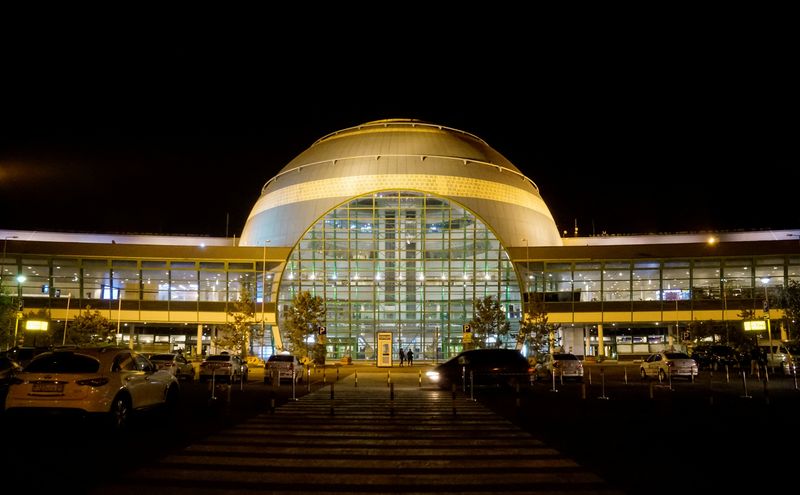By Joanna Plucinska and Gleb Stolyarov
LONDON/MOSCOW (Reuters) - Central Asian airlines are seizing opportunities from Russia's closed airspace, with airline traffic into the region booming in the year since Russia's invasion of Ukraine, executives and analysts said.
Flights in and out of the region have surged as airlines that previously flew over Russia are now passing through or flying over central Asia to get to Asia and the Middle East. New airlines, bolstered by government support, have also popped up to capitalise on the new traffic.
"A lot of people have moved from the conflict area into Central Asia...they have the linguistic affinity so we're seeing more flights into this area and we're seeing more dynamic economies," said Raphael Haddad, the head of Jetcraft Commercial, a firm that sells aircraft globally and in the region.
Since the early days of the war, Russian airspace has been closed to dozens of Western countries.
As a result, flights between many European countries and Uzbekistan have risen 105.9% since 2019 and 36% since January of 2022, according to Eurocontrol data.
Kazakhstan's Aviation Administration says passengers are up 16.5% year-on-year, while Kazakhstan's Air Astana announced 2022 as its best year ever with after-tax profit at $78.4 million.
Azerbaijan Airlines said the number of transit flights in the country's airspace rose 134% in 2022 compared to 2021.
In Uzbekistan, authorities have helped launch a new airline called Silk Avia and another called Air Samarkand, hoping to capitalise on the increase in traffic.
Air Samarkand, which has yet to start commercial flying, said it had received administrative support from the government. It hopes to focus its flights on markets in Turkey, the United Arab Emirates, Israel and Europe.
Silk Avia did not respond to a Reuters request for comment.
"The startups, some of them are supported by local governments or local businessmen that have seen an opportunity to enter a market which is becoming a more dynamic," Haddad said.
RUSSIAN AIRLINES STRUGGLE
The shift comes as European airlines struggle to figure out new routes into Asia since the closure of Russian airspace, while Russian airlines grapple with challenges in serving their local travellers still keen to go on holidays abroad.
Aeroflot had been trying to become a major transit line between European capitals and Asian countries via Moscow, including Thailand, China and Japan, since the mid-2010s along with competitors such as British Airways, Lufthansa, Turkish Airlines and Emirates.
It carried 3.6 million people on Europe-Asia routes in 2016 and had planned further expansion.
Now, they're even more hampered in achieving that goal as they struggle to operate as usual.
"The Russian airlines themselves are severely constrained in what they can do because of equipment shortages, they can't maintain the aircraft to sufficient standards," said James Halstead, an aviation analyst and managing partner at Aviation Strategy.
"They still have demand from those who want to go on holiday, they have links into the 'stans'. This is an opportunity for those like Air Astana to operate routes into Russia and through their hubs to provide the services that otherwise can't be operated."
And the region is expected to continue on an upward trajectory as travel from China resumes and global traffic returns to 2019 levels.
"The growth is not as significant as it could have been because COVID restrictions in China were in force during 2022. It will grow since the restrictions are lifted," one Russian airlines industry source said.
Data from airport body ACI Europe shows that, while traffic between Asia and Central Asia has increased since 2022, it is still around 20% less than 2019 levels.
If the war drags on in Ukraine, there could also be further opportunities for tourism in central Asia as Russian tourists look for alternatives to Europe for their holidays.
According to the Association of Tour Operators of Russia (ATOR), Russian citizens have made more than 23 million trips abroad to 142 countries in the past year.
The main tourist destinations were Turkey, with 5.2 million trips or about 25% less than in 2019, the United Arab Emirates, with 1.2 million trips or 21.2% more than in 2019, Egypt and Thailand.

"The Russians who have money and like going nice places and buying nice yachts will need to find a way of doing so," Halstead said.
"Maybe you'll see major ski resorts setting up in the 'stans' with luxury outlets to satisfy the Russian oligarchs because they can't go to Nice."